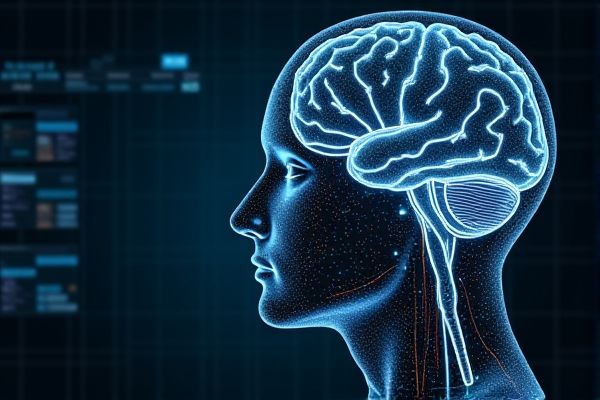
AI enhances psychological practice through advanced data analysis, enabling therapists to identify patterns in patient behavior and mental health trends. Machine learning algorithms can offer personalized treatment recommendations and monitor patient progress, improving therapeutic outcomes. Virtual therapists and chatbots provide immediate support, making mental health resources more accessible for individuals who may hesitate to seek traditional therapy. Integrating AI tools in psychology promotes a more tailored approach to mental well-being, addressing diverse needs and preferences among clients.
AI usage in psychology
Sentiment Analysis
AI can enhance psychology through advanced sentiment analysis, enabling researchers to assess emotional states from text data. Tools like Natural Language Processing (NLP) algorithms are employed to analyze patient responses, providing insights into mental health conditions. This technology offers the potential for early detection of issues such as depression or anxiety, leading to timely interventions. Examples include applications used in clinical settings, where therapists can better understand their clients' feelings and adjust treatment approaches accordingly.
Behavioral Prediction
AI can enhance behavioral prediction in psychology by analyzing large datasets to identify patterns in human behavior. Machine learning algorithms, for example, can be utilized to predict outcomes in therapeutic settings based on patient responses. Institutions like Stanford University are exploring these technologies to improve mental health interventions. This integration presents the possibility of more personalized treatment plans tailored to individual needs.
Mental Health Diagnostics
AI enhances mental health diagnostics by analyzing large datasets for patterns indicative of mental health disorders. For example, algorithms can assess speech and text from therapy sessions to identify symptoms of anxiety or depression. This technology increases the likelihood of early detection and intervention, potentially improving patient outcomes. Additionally, AI tools can provide personalized treatment recommendations, tailoring approaches to individual needs.
Therapy Chatbots
Therapy chatbots offer the potential to provide accessible mental health support to a wider audience. Tools like Woebot can deliver cognitive-behavioral therapy techniques in a convenient format. Users may benefit from the anonymity and availability of 24/7 assistance, which can help reduce feelings of stigma. Investing in this technology could enhance traditional therapy methods by providing real-time support when needed.
Emotion Recognition
AI usage in psychology can enhance emotion recognition through advanced algorithms that analyze facial expressions, voice tones, and body language. For example, tools like Affectiva are being developed to better understand emotional responses, which can lead to more effective therapeutic interventions. This technology allows practitioners to identify emotional states more accurately, potentially improving patient outcomes and engagement. Increased efficiency in emotion tracking may create opportunities for personalized treatments and interventions tailored to individual needs.
Cognitive Behavioral Interventions
AI can enhance the development of Cognitive Behavioral Interventions by providing personalized therapy options. Machine learning algorithms can analyze patient data to identify patterns and recommend tailored strategies for improvement. For example, institutions like Stanford University are exploring how AI tools can create adaptive interventions for mental health. These advancements may lead to increased accessibility and efficiency in delivering psychological support.
Psychometric Data Analysis
AI can streamline psychometric data analysis by automating statistical computations and predictive modeling. This technology allows psychologists to identify patterns and correlations in data more efficiently than traditional methods. For example, the use of AI algorithms in personality assessments can enhance the accuracy of interpreting results. Incorporating AI tools into research at institutions like Stanford University could lead to more nuanced insights in mental health studies.
Bias Detection and Mitigation
AI has the potential to enhance psychological research by providing tools for bias detection and mitigation. For example, algorithms can analyze large datasets to identify patterns of bias that may affect study outcomes. Researchers at institutions like Stanford University have explored these methodologies to improve the validity of psychological assessments. The integration of AI could lead to more equitable and accurate mental health treatments.
Personalized Treatment Plans
AI usage in psychology allows for the development of personalized treatment plans tailored to individual patient needs. By analyzing data such as patient history and responses to previous therapies, AI can suggest specific interventions for conditions like anxiety disorders. Institutions like the Harvard Medical School are exploring these innovative approaches to enhance patient outcomes. The possibility of more accurately matching therapy types to patients represents a significant advantage in mental health care.
Virtual Reality Exposure Therapy
AI can enhance the effectiveness of Virtual Reality Exposure Therapy (VRET) by personalizing treatment plans based on individual patient data. For instance, a program developed by a leading institution can analyze a patient's responses to different scenarios, allowing for tailored scenarios that better address specific phobias. This targeted approach may increase the likelihood of successful outcomes and improve patient engagement. As VRET technology continues to evolve, the integration of AI could open new pathways for treatment strategies in psychology.
 techknowy.com
techknowy.com